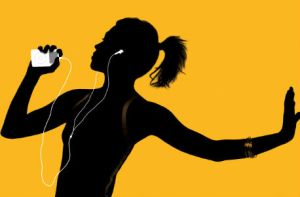Last week, I was working with a great running coach I know in London (James Dunne) as I honed my technique. It was gratifying to note that my running style was looking much better than it did about 6 months ago, but there was still some room for improvement. James suggested we did some strength training exercises, but focused mainly on increasing my cadence – the number of times my feet turnover, or strike the ground, per minute.
I was hooked up to a metronome which started bleeping at 184 beats per minute, or a cadence of 92. And off I ran, up and down a short stretch of the Thames path near Richmond. At first, I found it difficult to keep up and felt like I was prancing like a show pony. However, once I brought my speed down a bit and the cadence to 88, I felt sharp and snappy, especially when I compared it to how I ran when I tried to ignore the insistent bleep.
This little experience got me thinking about how we seek and use feedback in our everyday lives, especially when we are trying to learn a new skill or improve our practicing of a skill we already know. I was also thinking about how it can be hard to seek critical feedback to help us improve.
The research tells us that the impact of positive or negative feedback depends upon whether you are a novice or not. People learning a new skill tend to be concerned about evaluating their commitment. They are much more likely to stick to a goal after receiving positive (rather than negative) feedback. However, experts are most concerned about checking their progress towards reaching their goal. They are more likely to stick to a goal after receiving negative feedback, because it gives them information as to how they can improve their performance to achieve their goal.
If we follow this, people new in a particular job or taking on a new task will most likely seek positive feedback that they can reach their goal, like meeting a deadline. However, more experienced people will seek negative feedback which will help them stay on task and overcome distractions. It also seems like people seek feedback to try to manipulate their moods is a strategic and complex ways. For example, people may make themselves feel bad about their progress towards a goal, which – for some – acts as a motivator.
Most interestingly for me, these effects of feedback have implications for teachers or managers. For example, a manager can encourage goal pursuit by giving positive feedback to new people in roles unfamiliar to them, and increase negative feedback as the employee gains expertise. It’s a tricky balance though to gauge the type of feedback needed to motivate others, and also tricky when trying to understand the right time to ask for critical, and possibly negative feedback.
I’m glad James thought that I was skilled enough in my running now to take on the negative feedback offered by the metronome drills. I did find it motivating, and it made me think about why I found it so interesting.
James offered a careful balance of positive feedback when I was still learning how my body coordinated itself to adopt a new running style, while increasing the negative feedback as my level of skill increased. Coaching conversations aim to do the same.
Let me know if I can help. In the meantime, I’ll be sorting out an audio metronome of my very own.

